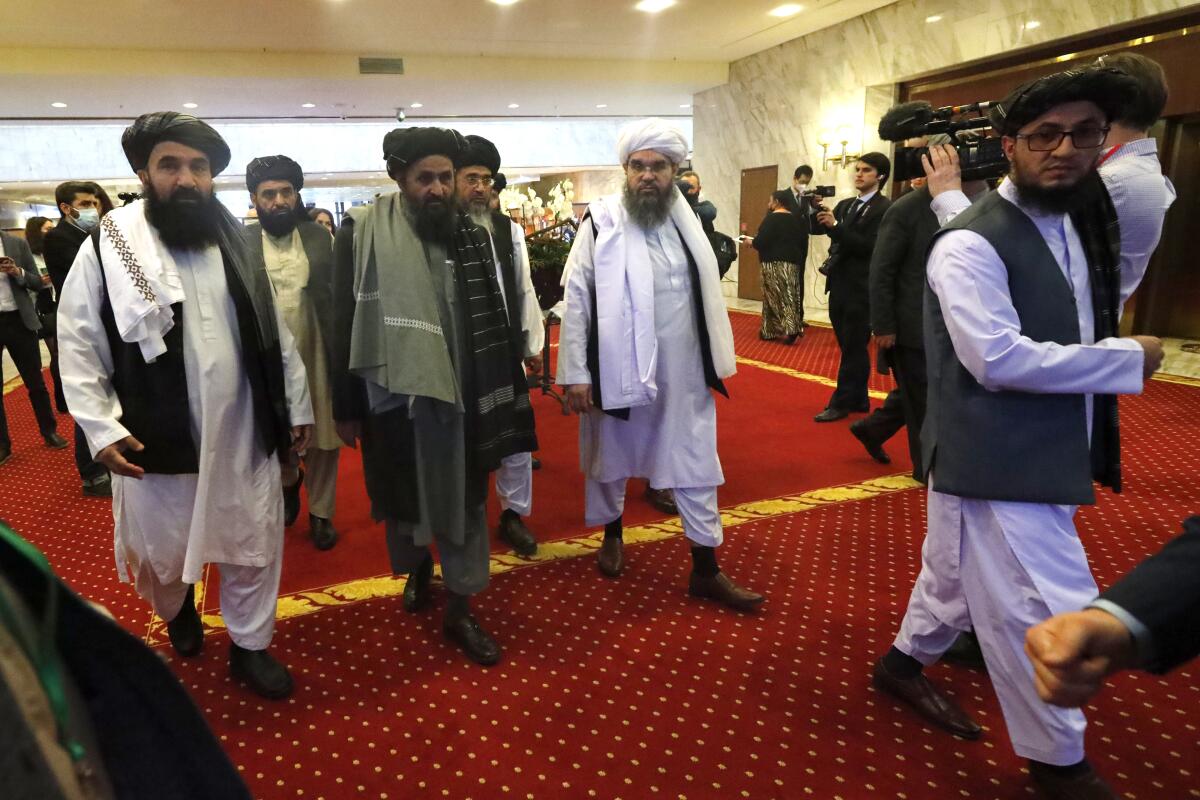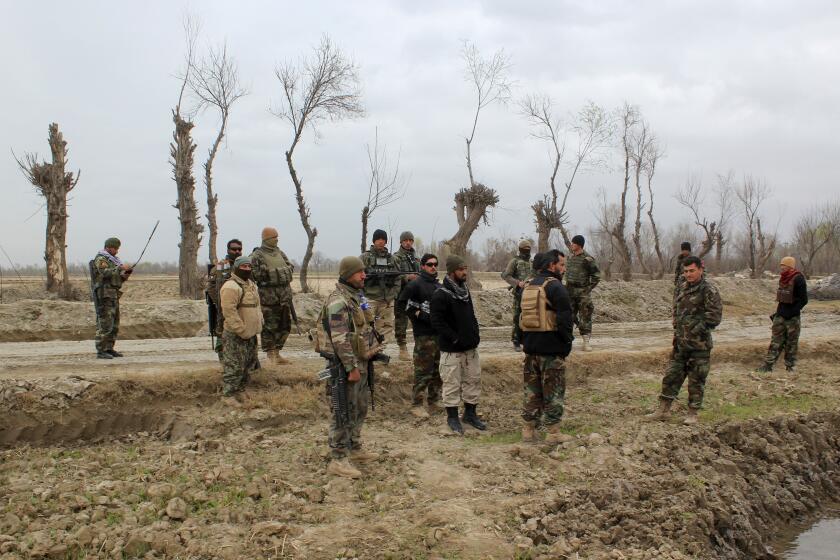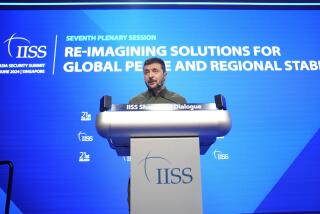U.S.-backed Afghan peace meeting postponed as Taliban balks

- Share via
KABUL, Afghanistan — An upcoming international peace conference that was meant to push Afghanistan’s warring sides toward a power-sharing deal and ensure an orderly U.S. exit from the country has been postponed, its sponsors said Wednesday, citing a lack of prospects for meaningful progress.
As the peace efforts stalled, Germany’s Defense Ministry suggested that NATO military planners were contemplating a possible withdrawal of international troops from Afghanistan as early as July 4. That’s more than two months ahead of the planned Sept. 11 pullout completion date.
“The Resolute Support headquarters in Kabul are currently considering whether to shorten the withdrawal period,” said German Defense Ministry spokesman David Helmbold. “The 4th of July is now being considered as a pullout date. The ministry informed the [German Parliament’s] defense committee about this today.”
Still, the delay underscored the difficulties that the Biden administration and the North Atlantic Treaty Organization are facing in orchestrating an orderly exit from conflict-scarred Afghanistan. Both have said they would begin withdrawing their remaining troops — close to 13,000 in all — from the country May 1 and complete the pullout by Sept. 11, no matter what.
The decision came several days after Taliban insurgents, who are key to peace efforts, dismissed the U.S.-backed conference in Istanbul, Turkey, as a political spectacle in service of American interests.
No new date was given for the conference, which was to start Saturday under the sponsorship of the United Nations, Turkey and Qatar. Turkey’s foreign minister said the conference was delayed until after the Muslim fasting month of Ramadan, which ends in mid-May.
The battle for Afghanistan began long before American troops arrived in 2001, and won’t end when the last U.S. soldier is gone.
Just hours before the announcement of the conference postponement, a suicide bomber in Afghanistan attacked a convoy of security personnel, wounding seven people in Kabul. The Interior Ministry said civilians and security personnel were among the injured.
The attack was the first in weeks in the capital, even as targeted killings have escalated and Afghanistan’s security personnel have come under relentless attack by Taliban fighters. Recent months have also seen an increase in government bombing raids on suspected Taliban positions and increased raids by Afghan special forces.
Kabul residents fear the attack could be a harbinger of what’s to come as foreign troops prepare their final withdrawal from Afghanistan. No one took immediate responsibility for the bombing.
Turkish Foreign Minister Mevlut Cavusoglu said the peace conference was postponed because of “lack of clarity” by the participants, but he did not elaborate.
Young Afghans fear losing new freedoms and their lives to the Taliban as U.S. troops prepare to exit.
The U.N. Assistance Mission in Afghanistan said in a statement Wednesday that the conference would be held at “a later date when conditions for making meaningful progress would be more favorable.”
Until now, the Taliban has refused to sign on to the conference even as Pakistan, where the group’s leadership council resides, has been pressing the hard-line Islamic militia to attend.
In Kabul on Wednesday, the Council for National Reconciliation, which is tasked with negotiating a peace deal with the Taliban, blamed the Islamic insurgents’ “lack of cooperation and readiness” for the delay.
Pakistan’s Foreign Ministry reaffirmed its support for the peace conference in Turkey, saying that “there is no military solution to the conflict in Afghanistan.”
A temporary bombing halt is one of many ideas the Biden administration is discussing if Taliban militants agree to reduce violence before peace talks.
The Taliban has accused Washington of breaching an agreement signed by then-President Trump last year under which the U.S. was to have withdrawn the last of its troops by May 1.
But President Biden last week said the remaining estimated 2,500 U.S. troops would only begin their withdrawal May 1, not complete it. All American and NATO troops would be gone by Sept. 11, the 20th anniversary of the terrorist assault in the United States that launched the U.S.-led invasion to hunt down Al Qaeda leader Osama bin Laden.
On Sunday, the Taliban issued an English-language statement on its website Al Emara indicating its leaders were not ready to attend the conference. It said that a propaganda campaign had been launched, hyping expectations that a peace deal would be reached at the end of the 10-day meeting.
The statement said this was an attempt “to push the Taliban, willingly or unwillingly, to a rushed decision which was needed by America.” It alleged that the aim of the conference was to “complete a for-show road map before the withdrawal of foreign forces.”
News Alerts
Get breaking news, investigations, analysis and more signature journalism from the Los Angeles Times in your inbox.
You may occasionally receive promotional content from the Los Angeles Times.
Government-allied negotiators in Kabul had anticipated a delay as none had received an invitation to the conference and several were without visas to Turkey.
In Washington, State Department spokesman Ned Price would not confirm the postponement but said the U.S. would continue diplomatic efforts to reach a peace deal.
“When it comes to the talks in Istanbul, this gets to the point that, from the very earliest days of the Biden administration, we have recognized ... that there is no military solution to the conflict in Afghanistan, and only through a political settlement and a comprehensive cease-fire will we be able to support a resolution that brings security, stability and prosperity to the people of Afghanistan,” Price said in a statement.
More to Read
Sign up for Essential California
The most important California stories and recommendations in your inbox every morning.
You may occasionally receive promotional content from the Los Angeles Times.













